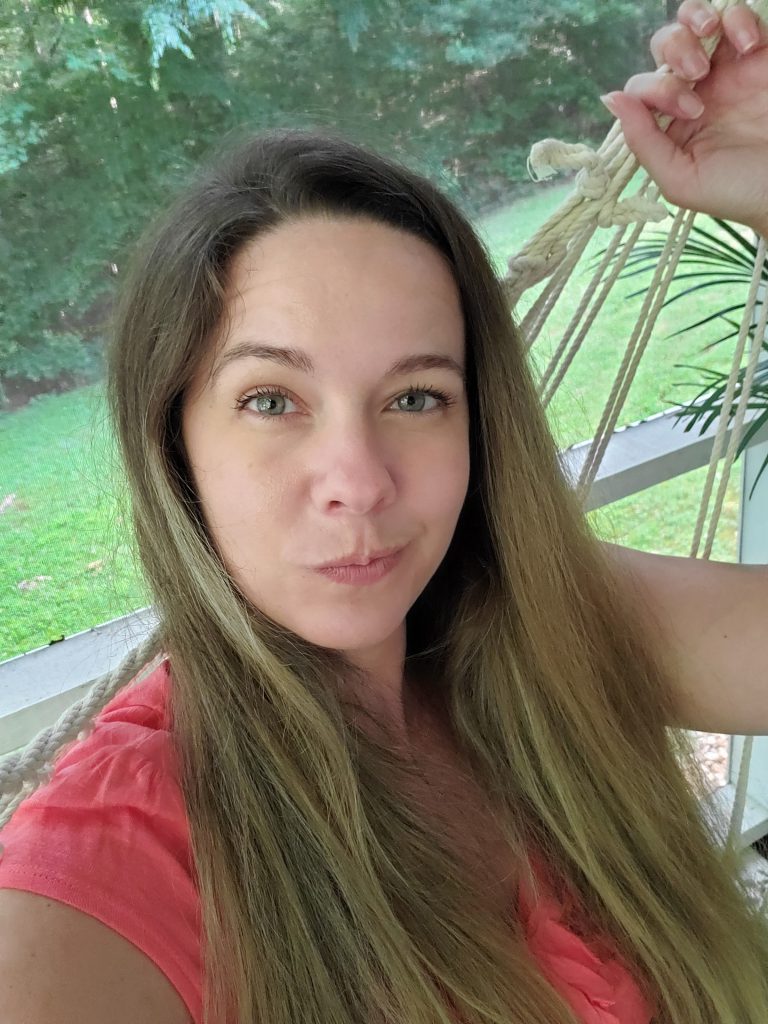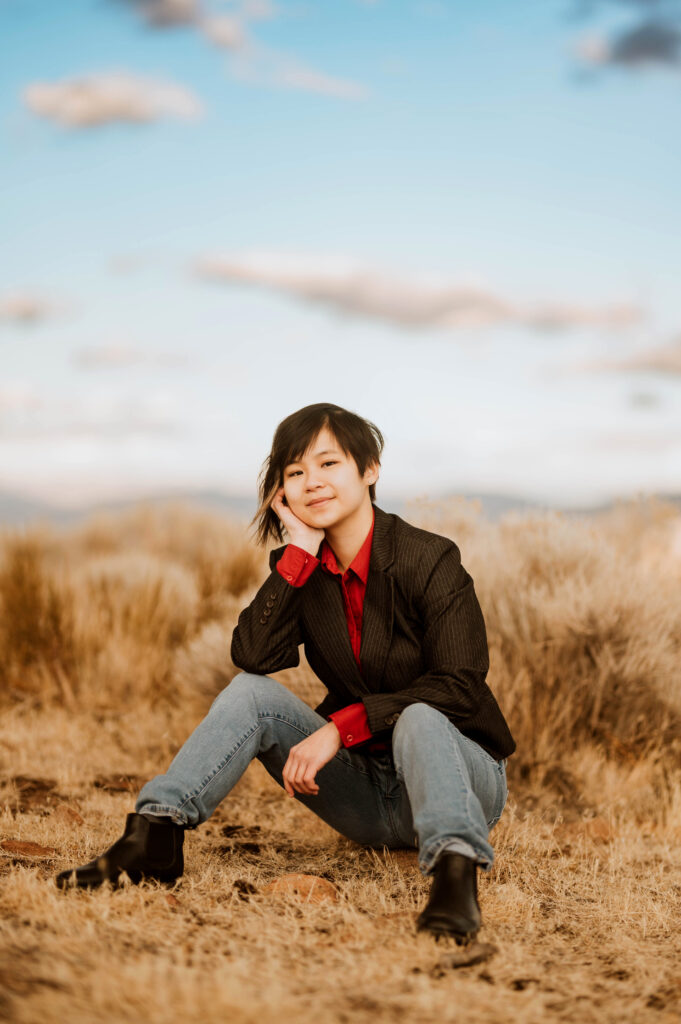edited by Hal Y. Zhang
Content note (click for details)
Content note: anti-Asian racism and misogyny, murder, body horror, gore, pet death.The first time Margie raised the dead, it was to prove she didn’t eat her dog. As Harold hadn’t been walked around the neighbourhood recently, her classmate Brenda assumed Margie’s family devoured their dog and caught SARS.
Harold was a beloved member of the Lungs. That grey fluffy Pomeranian guarded Margie since she was born. He spent his final months lying limp on his beanie bed, yet he growled and his fur stood on end whenever the doorbell rang.
Margie arose before dawn to bring Harold back. She squeezed between the backyard’s fence and shed to reach his resting place. She flung fistfuls of dirt off the soaked shoebox. Worms and maggots crawled up her wrists at the sudden disturbance; she brushed them off with her hands.
Poh Poh taught her to raise the dead; with brushes dipped in chicken’s blood, they wrote spells on paper, copying from old instruction manuals, and practiced on mangled squirrels and sparrows in the backyard. Those animals stood, brown wings and furry black arms raised, and hopped towards a small ditch as Poh Poh knelt and rang a bell. Their powers were used for undertaking. Why not do other things before the dead were laid to rest?
Margie pulled a yellow talisman from her waistband and punched it through the box. Gas, grit, and flies burst from her force. The cardboard coffin and surrounding dirt trembled and collapsed inward. A high-pitched yelp came from the grave.
Harold poked his head out of the ground. He licked his pointed nose. His beady black eyes widened staring up at her. He yipped a greeting and wiggled his whole form to shake the insects off and out of him.
“Morning, Harold.” She pulled him by the paws to get him to stand on all fours. Harold wagged his short tail with vigour and smiled with his tongue out. He was so excited to see her and have his strength back! “Wanna walk?”
Harold limped towards her; the surgery he had on his hip last year never fully healed.
Margie retrieved the black leash from her pocket and attached it to his collar. When her parents buried him, they left his collar around his neck because he was irreplaceable.
Margie led them out the backyard. Harold hopped once, twice, then kept to it to follow by her side. The talisman on his back flapped up and down with each bounce. No matter how stiff, goeng-si could always jump.
Based on the dark sky and bright streetlights, it was around six a.m. Brenda’s dad jogged wearing a Walkman, fanny pack, and tracksuit with orange neon stripes. If Margie found him and showed him her dog, he could tell his daughter nobody devoured Harold and he died of old age.
Cedarvale Park’s entrance opened with a misty paved path flanked by tall trees. Leaves crunched under Margie’s slippers. Harold panted. Drool dripped out his mouth and onto the sidewalk.
“Are you tired?” She couldn’t wait for Harold to adjust to his new state; her family wouldn’t understand her motives. They ran a funeral home to send the dead away, not bring them back. Or, at least, they didn’t anymore. They ended the whole leading-the-dead business generations ago.
Her parents and older sister, Evelyn, told her it was disrespectful to revive the dead. How did they know? They never asked goeng-si what they thought. In movies, they usually went on rampages until they were subdued by someone. Margie wanted to sit one down and ask why they came back with bloodthirst.
“Margie, stop!” Evelyn pounded towards Margie in her pajamas.
Harold’s tail wagged and he yipped in greeting.
Margie was going to get an earful from Evelyn. Margie snatched Harold into her arms and charged into the park, dashing up a slope with tall grass. Evelyn, chasing her sister, tripped and slipped into the dirt. Margie reached the top. A man with a racket in the nearby tennis court turned to her. Harold bared his fangs and snarled at the stranger.
“What’s wrong with your dog?”
Nothing’s wrong with him. Margie ran around fencing and hid behind a tree, leaning against the trunk and panting. She’d never find Brenda’s dad now. She had to try one last thing. She held Harold up, so their dark eyes stared straight into the other’s.
“Find Brenda’s Baba!” She had the image of a middle-aged skinny jogger in her mind and burned her gaze into Harold.
He stared at her in concentration. She was trying to teach him a trick and he couldn’t decipher the action he had to perform to get a treat.
Evelyn yanked Margie by her shirt collar. Harold dropped to the ground. Margie kicked and shrieked as her sister gripped her by the waist, but she wouldn’t let go.
“Do you know how much trouble you’re in?”
***
Harold barked and barked at the sisters. They were a pack; infighting like this was never allowed! Sometimes, the two of them argued, but it never got this physical.
Margie’s mouth released a long high-pitched cry. Tears streaked her face. She wailed like that when she was a puppy, spending her days sleeping and feeding. One day, she’d be as big as the other humans because he protected her. Why he had been buried in a box in the backyard was a mystery, but he could bark and follow Margie again.
Margie collapsed onto the ground and he ran up to her. Evelyn yanked the paper off his back and the world went black.
***
The second time Margie raised the dead, it was to extend a long life that should’ve gone longer.
Poh Poh chose to die at home. She didn’t want to be tended to by strangers in a hospice and have instruments run on her. She lay on her wide bed with several layers of blankets. Her cheeks had grown sallow and the outlines of her neck and collarbone creased her skin as she lost weight. A black beanie covered her head as her white hair was styled short.
Mama raised a spoon of congee to Poh Poh’s lips. “Eat.”
Poh Poh parted her lips, took a small sip, and turned her face away. Margie stayed by her grandma’s side, scribbling in a notebook, as relatives entered and left checking in on Poh Poh.
In the afternoon, her chest went still. With her eyes closed and face laxed, she appeared to be sleeping. Once an aunt noticed Poh Poh wasn’t breathing, she called for everyone to gather in the bedroom. Among the crowd, several sniffled or covered their teary eyes. Murmurs about what to do next circulated through the room. Margie knelt in the corner and put her hands over her ears.
Harold’s body rotted behind the shed years ago and was unretrievable, but Margie wouldn’t let Poh Poh leave, not until she was ready. They were supposed to grow bitter melons together in the backyard, as they did every summer. The seeds in the aluminum dishes they set on a windowsill had germinated with tiny white roots sprouting. The crops’ yellow flowers sometimes moved in the direction of the sun. Their leaves shriveled as the nights grew colder. Who was going to look after them with Margie?
Life wasn’t fair. Death was unfair. Why just stay here and accept death? Who was Margie, other than someone who could redefine what being alive meant?
Margie dashed to her bedroom and rummaged through her drawer. Poh Poh was illiterate, but she taught Margie how to write and copy spells. If she had regrets or things left unsaid in this life, Margie would give her one last chance before moving on.
“Get out of the way!” Margie waved the talisman above her and charged into Poh Poh’s room.
“Ah-Margie, stop!” Mama grabbed her daughter’s arm, but Margie jerked away as her mother’s nails left long pale scratches along her skin. She slapped the talisman on her grandma’s forehead. Poh Poh’s eyes popped open and she sprang sitting up.
A cousin screamed at the back. How could Margie use her powers on their matriarch?
“Poh Poh!” Margie grabbed her grandma by the sleeve and shook her. “Say something!”
She passed away ten minutes ago. If she needed to speak, she could do it now, before it was too late. Relatives yanked Margie back. She cried out and stretched her hands out to Poh Poh. She couldn’t be the only one who wanted Poh Poh to stay with them. Who didn’t want their grandma to live forever?
***
Poh Poh observed wrinkles and spots on her adult children and pimples and braces on her grandchildren; her sight had never been better in years. Everyone yelled at each other in the room. All their words meant nothing, travelling jumbled in a circle.
The yellow talisman fluttered up and down Poh Poh’s face. Ah-Margie did that. She was brought back to life minutes after death. Was it worth it? It had been generations since their powers were needed to lead the dead home. She wanted to be buried here, in Canada, beside her husband; she had no intention of returning to her birth village.
Ah-Margie’s eyes were round and focused on Poh Poh even as she was pressed down on the floor by relatives. Poh Poh’s false teeth gleamed between her lips as she smiled. Her laugh was dry and hoarse as her chest expanded with air. She was right to pass on her knowledge of raising the dead. Ah-Margie could, would grow and guide the dead to a dignified final journey. That was all Poh Poh wanted.
She yanked the talisman off, lay back, and resumed being dead.
***
The third time Margie raised the dead, she didn’t have any other choice.
No matter the trauma, body bags were supposed to be still. The zipped white pouch was motionless on the table, yet something beat within Winona’s body.
Margie rubbed her blurry eyes. The back of her head buzzed. Was she imagining things? She had stayed late at the funeral home browsing online.
When Winona was found dead, stabbed outside Spadina Station, a media circus broke out. Editorials discussed how this was related to the rise of anti-Asian hate crimes due to the COVID-19 pandemic, or how it wasn’t. Authorities investigated it as a random incident; the killer was unknown, so there was no evidence she was targeted because of her race or gender.
On social media, people declared this sort of thing didn’t happen in Canada. Others posted proof to the contrary: the construction of the Canadian Pacific Railway, Vancouver anti-Asian riots, internment camps, the head tax and Chinese Exclusion Act, border controls, carding, the bamboo ceiling—that was their Canada. What did people do when faced with this? What could someone do?
Winona was named after the area her family immigrated to in Toronto. Margie lived nearby, walked through it, and went to school there. They might have encountered each other in a convenience store selecting candy, browsing through an aisle of books in a library, or waiting at a bus stop.
The body bag expanded and deflated; Winona breathed.
Margie’s hand twitched. This corpse needed to be controlled before it arose and sought vengeance. Anger was the fluid that brought her back to life. Margie was supposed to quell goeng-si from rampaging by placing a talisman on their forehead and leading them to their resting place.
When Margie brought the dead back, she was supposed to guide them towards peace. She had done things backwards with Harold and Poh Poh; they had no reason to come back as they lived long, fulfilled lives and were cared for at death. Winona had none of that. She wouldn’t leave for the afterlife until she got revenge. All Margie needed was a talisman written with chicken blood to give Winona peace. What was the point of having powers if you didn’t use them to fight for a good cause?
The body bag trembled and drummed against the table. Winona extended her limbs and clawed and kicked the pouch like a creature emerging from a womb. Margie unzipped it.
***
Winona had to escape. In the dark, she swiped and punched. Her heels banged the solid surface behind her as the world shook. She tore at her back and dug nails into her wounds. He stabbed her there so many times, when would he stop?
White light beamed on her. Was this a trick of her assailant? Winona extended her fangs and claws to counter whatever came at her.
Her forehead was slapped and vision obscured in white and black by a strip of paper. Her body froze. The world was now dark blue. A small stream flowed over mud and stone. On each side of the water were trees with yellow and orange leaves. Cedarvale Park: she had jogged through there, years ago. Why was she seeing this?
“You’re safe in my family’s morgue,” a woman spoke.
What was she doing here? She was fending herself off from an attacker after leaving Spadina Station. She wanted to grab a book from Robarts Library; classes were finally happening on campus again. The students in her tutorial expected to discuss the professor’s assigned readings. She had to grade papers, edit her thesis, and grab groceries for herself and her fiancé. She couldn’t be dead.
Why was this happening to her? Why did she live to learn about her own death? Winona uttered a cry; something hoarse and hollow emerged from her mouth. Had her body decomposed so far that she was without speech?
A hand stroked her hair. “I’m here to help.”
What could this stranger do for her? She couldn’t return to what her life was.
“Winona.” The woman clasped her hands, claws, and flesh. “They haven’t found your killer, but you can. You’re both connected, whether you like it or not.”
Winona gripped the hands that were offered to her. Her pointy nails dug into the other’s skin. Warm droplets of blood rolled down her wrists. If Winona did nothing, he’d get away with murder.
“I’m from the same place as you, Winona. Men honked at you from cars since you were a teen too, right? You’ve been followed and asked where you’re from. No, where’re you really from?”
It wasn’t just strangers. Her classmates, acquaintances, and exes grabbed her, insulted her, hit her. She was punished for just existing. She always kept her head down and fled in silence. What else could she do? She was helpless, until she died.
“You’ve thought about getting back at all those assholes, haven’t you? We all have.”
Her killer was like all the others who wronged her. He’d continue hurting and targeting others if she didn’t stop him. Winona ground her fangs. Her sharp teeth could crunch down on her killer’s bones and reduce them to bits. She’d render him small for her consumption by tearing up his flesh with her bare hands. She defied heaven and hell to return here; she was the strongest being alive.
She’d thoroughly disrespect him. Her feet could stomp and crush all his organs. She’d splatter blood over his home’s walls and ceiling with the force of her fists. He’d never find closure to his violent end.
“You have a few hours before you have to come back here.” The woman let go of Winona.
***
As the blue-haired VTuber hit the high note at the end of her song, clapping hand emojis flooded the chat. Margie watched the singing streamer on her phone as she waited in the kitchen. She sent several messages with heart icons.
Margie grabbed a dampened cloth and lifted her wok’s lid. Steam puffed up in a cloud, as did the aroma of shrimp, eggs, and chives. The stirred eggs in the tin dish solidified into yellow and white, with a bubbly surface spotted with chopped green onions and mini shrimp. Their tiny black eyes dotted the surface. This was how Poh Poh made it. Margie set it on a coaster and cut it apart in quarters. As she lifted a slice up, the ends of glass noodles hung out.
Her apartment door creaked open. The footsteps were heavy with every stomp and hop.
“Oh, you’re here? Are you hungry?” Margie set up two bowls on her table with steamed eggs and rice. Margie held a spoon; if Winona needed to be fed, she’d help.
The goeng-si turned the corner into view. Winona kept a hand on the wall to support herself. Her palm left streaks of blood on the white wall. Her head tilted right, along with the talisman on her forehead. Margie’d scrub up the blood soon.
Winona stared at Margie. The rank pungent smell of human flesh and blood wafted throughout the kitchen as she exhaled; it was stronger than when corpses were drained of blood for embalming. Winona’s clothes were soaked red. They dripped a dark trail on the floor. She had eaten well.
Margie doubled the portions for nothing. She’d stretch her rice and eggs for lunch and dinner, maybe save some for tomorrow.
“Sit down, at least.” Winona was going to continue hopping as she stiffened and returned to death. Margie retrieved a dark hoodie from her bedroom. She stood by a seated Winona and held the garment up.
“Wear this and we can go back to the funeral home.” Did Winona understand the implications? Her family wanted an open casket viewing. Her face needed to be patched up with wax, clay, and makeup to hide the cuts and bruises.
Winona turned her head up to Margie. Her glassy eyes were spotted red, brown, and black.
“You killed him, right?” Margie said. “Is there anything else you need to do?”
Her head bobbed back, then forward as a nod to her first question, then her head swayed left and right for no. The talisman followed her movements. Margie couldn’t peer into the goeng-si’s mind. If she could, she would’ve asked Harold if he appreciated her placing blankets on him as he slept on his beanie bed and questioned Poh Poh about her adventures subduing the undead.
Margie covered Winona’s head and arms with the hoodie. From a distance, the blood was unnoticeable. The bandages around Margie’s hands pressed against the other person.
In the morgue, the goeng-si’s nails dug deep into Margie’s skin. One way to become a goeng-si was through infection. Tomorrow, she’d unwrap her bandages. If the punctures were coloured anything like a corpse’s, she’d consult the old manuals for antidotes to remove her poison; if that didn’t work, Evelyn would have to subdue her by slapping a talisman on Margie. As tempted as Margie was to prepare comebacks for her sister’s scolding, she had to deal with Winona first.
“Can you run for thirty minutes? That’s all we need.” If Winona jumped from roof to roof as Margie jogged on the sidewalk, they could travel without raising suspicion.
“Y-s….” Winona’s legs trembled as she stood. Margie held Winona by the arm to help her stand.
Her parents would have arrived at the funeral home about now and they’d have to let her in. They sensed when corpses arose. This time, they were too far away to control her. What could they do? Turn her in to authorities and expose their powers? They were forced into silence now. In the end, Margery Lung was unstoppable.
Margie patted Winona’s shoulder as she headed to the front door. According to Poh Poh, their ancestors, for a fee, may have marched the dead from cities back to their birth villages at night by using talismans. They rattled bells to warn people to stay away from them.
She rang her handbell to begin the final command.
© 2024 by Lisa Cai
3288 words
Author’s Note:
The story’s setting is close to home; I live, work, and play near the Oakwood Village area in Toronto, where Winona Drive is. While Canada likes to prop itself up as a welcoming and multicultural place, it is not without its flaws. I wanted to highlight the historical, cyclical, and systemic violence Asian people, especially Asian women, are subjected to. Using the goeng-si, I wanted a victim of such violence to get revenge.
Goeng-si (also called jiāngshī) are hopping vampires or zombie-like creatures from Chinese folklore. They’re usually depicted wearing Qing dynasty official outfits with talismans clinging to their foreheads. A human may turn into one due to things such as getting attacked and infected by a goeng-si, a bad death (i.e. murder, suicide), or a Taoist priest needing to transport the deceased. Goeng-si genre films experienced breakthrough success in the 1980s with franchises like Mr. Vampire, a Cantonese language series produced in Hong Kong.

Lisa Cai is from Toronto, Canada. She has been published in The Dark, Polar Borealis Magazine, and others. When not reading or writing, she is probably wrangling with IT at a university, watching anime, taking a long walk, or solving crimes in Among Us. Her socials are listed at https://linktr.ee/lisacai.
If you enjoyed the story you might also want to visit our Support Page, or read the other story offerings.









